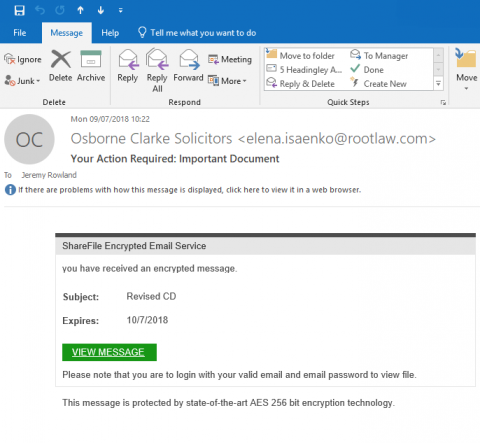Scam communications and Osborne Clarke
Published on 7th March 2025

Like other professional service firms, from time to time Osborne Clarke’s name (or the names of its solicitors) are used by fraudsters in scam emails, letters and faxes to add credibility to the fraudulent communication.
While we cannot police such scams, this page highlights those scams which have been brought to our attention and which we consider may pose a risk to other potential victims.
Osborne Clarke will never issue unsolicited communications suggesting that the recipient may be in a position to benefit from an inheritance from a named estate (e.g. “the estate of John Smith”). Similarly emails advising a change in our bank details, or requesting that you divert bill payments to a non-Osborne Clarke account, are highly likely to be fraudulent. If you receive such a communication please treat it as a scam.
If you receive a communication bearing the name "Osborne Clarke Law Corp", "Osborne Clarke Solicitors", "Osborne Clarke & Partners UK", "Osborn Clarke", or from any email address other than osborneclarke.com it is also likely to be fraudulent.
If you have received a communication purportedly from this firm and you are unsure of its authenticity, please do contact our press office.
You can find more information on fraud including scam emails and how to report them on the Actionfraud website here.
Please note that communications intended for Osborne Clarke, that are mistakenly sent to an email domain other than "@osborneclarke.com" could be received by third parties, not associated with Osborne Clarke. When sending information to Osborne Clarke, please ensure that emails are addressed to the correct recipients.
Specific fraudulent communications of which we are aware:
None of the following matters are originated by Osborne Clarke. If you have received a communication resembling the ones detailed above we advise you to ignore it and do not contact the sender.
- Updated 21 August 2025: We are aware that the scam noted on 31 July is ongoing, using the same strategy.
- Updated 31 July 2025: We are aware of a scam email purporting to be from Osborne Clarke LLP with the subject "Intellectual Property Rights Violation Notification - Osborne Clarke LLP". The email is sent from the address noreply@appsheet.com and claims to represent one of a number of small companies.
The email falsely accuses recipients of intellectual property violations and demands actions to avoid legal liability. It includes a link to download supposed evidence and requests recipients to remove content and provide a written statement. We have seen examples of this scam involving at least four small, unrelated companies.
Despite the references to Osborne Clarke in the email, we have no affiliation with the companies mentioned. The email is a scam, and we advise recipients not to click on any links or provide any personal information.
- Updated 7 March 2025: We are aware of a Kaidsart LLP website using Osborne Clarke content, branding and images of our people. It has also been brought to our attention that a Rhys Faulkner of Kaidsart LLP is impersonating Conrad Davies and using his picture on the Kaidsart LLP website. The website is a scam website and the law firm Kaidsart LLP a bogus law firm. Despite the references to Osborne Clarke on the website, we have no affiliation with a Rhys Faulkner or Kaidsart LLP.
- Updated 6 January 2025: We have been made aware of scam emails from a 'Claire Anderson' or 'Claire Stafford' using five different domains (osborne-clarkelaws.co.uk, osborne-clarkeslaw.co.uk, osborneclarksllp.co.uk, osbourne-clarkelaw.co.uk, osbornes-clarke.co.uk). These emails falsely claim to be from Osborne Clarke and request an urgent response regarding unpaid invoices.
- Updated 24 October 2024: We have been made aware of a scam email campaign purporting to be from an OC lawyer and sent from a variety of false Osborne Clarke email addresses. The email confirms that the recipient has unpaid invoices and asks that they respond urgently. The email addresses used include osbornesclarke.net and @osborneclarkelaw.co.uk, these are not email addresses that are used by Osborne Clarke LLP.
- Updated 19 September 2023: we have detected a possible cybersquatting attempt: osbornesclarke.com. That domain name may be used for a phishing attack or other cyber or invoicing scams
- Updated 16 December 2022: We have been made aware of a company which is using the name "Osbourne Clarke Consultancy". Osborne Clarke LLP has nothing to do with this company and is not affiliated or associated with it in any way. Osborne Clarke LLP does not support or condone any of their activities.
- We have also detected a possible cybersquatting attempt: osbourneclarkeconsultancy.co.uk. That domain name may be used for a phishing attack or other cyber or invoicing scams.
- Updated 6 September 2018: We have been made aware of scam emails, with false Osborne Clarke addresses, requesting that clients divert their bill payments to a new account. False addresses we have seen so far include 'osbornaclarke' or ending in '.llaw.uk', which we do not use.
- Updated 10 July 2018: Emails referencing "important documents" and asking you to log in to ShareFile with a valid email and email password to view the file. The email purports to be from "Osborne Clarke Solicitors" and is sent from multiple domain names - here's an example:

- Updated 13 March 2018: An email referencing a deceased relative who died in an 'auto accident' and has left an inheritance (with the recipient of the email said to be a ‘devisee’). The email purports to have been sent by Mr Kevin Barrow and asks that the recipient 'affirm' receipt.
- Updated 8 November 2016: An email from mswesker.osborneclarke@groupmail.com purporting to be from Mark Wesker. This scam appears to involve the request of information, including financial information, from entities based in Europe and North America.
- Updated 16 May 2016 : An email from osborneclarkeandpastnersuk@gmail.com purporting to be from Barrister Madeleine Clarke (QC.). This scam appears to be based in South Africa and involves the will of a deceased person with the same surname as the recipient.
- Updated 15 October 2015: an email regarding a transaction in which the sender requests a deposit for a transaction that is in its final stages of negotiation. The sender refers to an Alexander Schofield, and proposes he will be in touch over the course of the day. You will then receive an email purporting to be from Alexander, using the address alex.schofield@workmail.com.
- Updated 2 April 2015 : An email from oclarkeandpartnersuk@outlook.com purporting to be from Barrister Madeleine Clarke (QC.). This scam appears to be based in South Africa and involves the will of a deceased person with the same surname as the recipient.
- an email or letter referencing the will of a Ms. Gina or Ms. Tihana [surname will match recipient's surname] (deceased). There might be other names that are being used that we are unaware of. The communication suggests that the recipient may be in a position to benefit from an inheritance if they purport to be a member of her extended family. This scam appears to originate from Valencia and is sent in the name of Sr. Osborne Clarke on behalf of Osborne Clarke Spain, the email address is osbornecl@lawyer.com.
- an individual issuing fraudulent cheques using the name Paul Anning and purporting to work for ‘Osborne Clerke Chamber’. This scam appears to be based in the US and involves an individual commissioning work from companies and attempting to pay for it using fraudulent cheques.
- an email or letter referencing the will of a Mr Jack McCulloch (deceased). The communication suggests that the recipient may be in a position to benefit from an inheritance if they marry his daughter.
- a request for copy editing and proof reading support purporting to come from Tim Birt.
- an email or letter referencing the wills of people with the same surname as the recipient. The sender is Mr. Osborne Clarke B.A.,Sc.,LLB,P.Eng. the email address being osborneclarkelaw1@gmail.com. The communication suggests that the recipient may be in a position to benefit from an inheritance.
- an email regarding an inheritance from the Anderson family. The sender is Mr Bill Baker of Osborne Clarke, the email address is osborneclarke@lawyer.com. The communication requests personal information to enable them to benefit from an inheritance.


